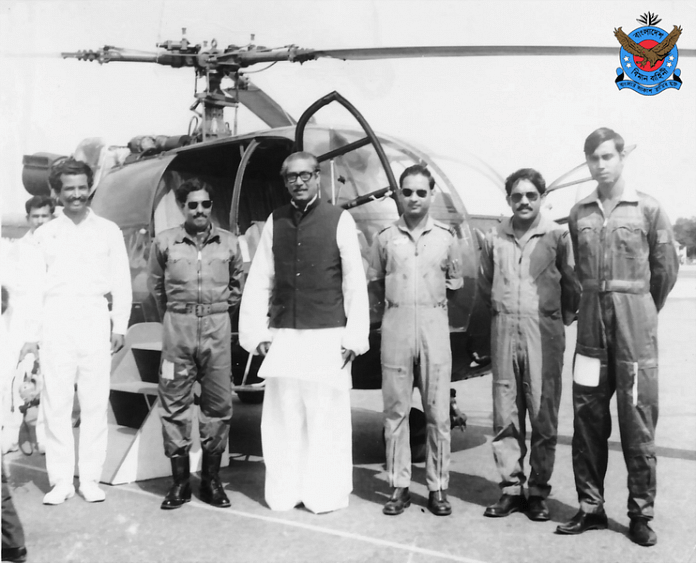
New Delhi: The execution of Abdul Majed, one of the killers of Bangladesh’s founding father Sheikh Mujibur Rahman, has not just ended one of the worst chapters in South Asia’s political history, it also strengthens the position of Mujib’s daughter and Bangladesh Prime Minister Sheikh Hasina, especially in the year that the country is celebrating the birth centenary of Mujibur called ‘Mujib Barsha.’
Despite the threat of the deadly novel coronavirus, hundreds of people had gathered in front of the Dhaka Central Jail as Majed was executed midnight Saturday, 11 April.
Majed, along with a few others, was involved in the assassination of Mujibur, which occurred during a military coup on 15 August 1975.
In 2010, five of those who admitted to taking part in the assassination were hanged. One man died of natural causes in Zimbabwe. The other six convicts, including Majed, were at large. Officials say at least one of them is in Canada and another in the United States.
The Bangladesh Supreme Court had on 19 November 2009, upheld the death sentences of Majed and 11 other self-confessed killers of Mujibur, fondly called Bangabandhu.
On 7 April, Bangladesh Foreign Minister A.K. Abdul Momen had said that while his government was making efforts to bring back Bangladeshi nationals from abroad due to the Covid-19 pandemic, he hoped the five fugitive killers would also be brought back to the country.
“I expect, it will be possible to bring back the rest of the killers here within Mujib Borsha,” he said.
This came after Bangladesh Police’s Counter Terrorism and Transnational Crime (CTTC) department was able to nab Majed, serving a death sentence for the last 45 years, in Dhaka’s cantonment area.
Also read: Bangladesh is rising while Pakistan is sinking — praise from Modi on Mujibur birth centenary
Majed may have lived in India
Majed reportedly lived in India since he fled Bangladesh in 1996 when Prime Minister Hasina, Mujib’s elder daughter, came to power with her party Awami League. On assuming power, she wasted no time in repealing the Indemnity Ordinance, which provided immunity to Mujib’s killers.
Majed, along with four others, fled the country.
According to Bangladeshi press, Majed, once an army officer, first went to Libya, then Pakistan and finally entered India where he allegedly stayed for about 20 years in Kolkata.
Bangladesh Home Minister Asaduzzaman Khan, however, told PTI that while previous reports indicated he was in India, he was arrested in Dhaka as he had secretly returned last month.
But a former diplomat told ThePrint that there is no evidence he lived in India.
“There is no concrete evidence that he was in India or that he was hiding in Kolkata. Even if so, he has been sent back and now he has been executed. Dhaka has welcomed it,” Veena Sikri, former Indian High Commissioner to Bangladesh, told ThePrint.
“These people were given plum posts and were being treated royally by the previous BNP (Bangladesh Nationalist Party) regime,” Sikri added. “Even if he came here illegally, it would not have been easy to locate him. I would say it was an intelligence success to locate him. India is being circumspect about it, which is good.”
A former Indian Intelligence Bureau official, who was posted in Dhaka some years back, corroborated Sikri, in that Majed enjoyed a cushy life when BNP’s chairperson Khaleda Zia was in power.
But according to the official, who did not wish to be named, Bangladesh under Hasina was always on the lookout for these killers and had discussed the matter with previous as well as present governments of India.
Also read: Europe cancels $1 billion garment orders from Bangladesh as coronavirus hits demand
Execution strengthens Hasina, Awami League
Mujib had created the Awami League, which after his assassination in 1975 went into hibernation as dictator upon dictator ruled Bangladesh.
The opposition BNP, led first by Zia-ur Rahman and then by his wife Khaleda Zia, were both rulers, until 1996 when Hasina won the elections and became Prime Minister.
“This development surely strengthens Hasina’s position in Bangladesh, where the society is now deeply polarised,” said veteran diplomat Neelam Deo, who oversaw the India-Bangladesh relationship from Delhi.
“Her election mandate was to bring closure and nab the killers of her father,” added Deo, who is also the director and co-founder of think tank Gateway House.
Last month, the Hasina government also released Khaleda Zia from jail.
The 74-year-old Zia, who has been Prime Minister of Bangladesh twice, was convicted in February 2008 and sent to jail over corruption charges, dealing a body blow to her party.
This report has been updated to reflect the current designation of veteran diplomat Neelam Deo.
Also read:Not all Muslim nations love Modi. This is why Iran, Malaysia, Turkey don’t

How Abdul Majed the last hanged killer of Sheikh Mujib hide in India ? That’s mysterious.
It could be possible. May be support from some section of muslim religious leaders/politicians and collusion with few political parties striving on vote bank politics.
Being retired army officer, I have been able to understand the articles in their totality.
Thanks Almighty Allah. Bonghobondu Killer at last killed.23 years lived in n? Is it failure of India’s Intelligence or Intentional?Anyway Thanks India for 1971.
Mujib killers are gone. Fine, and when Hasina is going to be hanged? This lady killer is way worse than the people who brutally killed Mujib family in 1975.